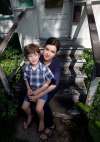Funding cut for special-needs kids
Tories accused of putting deficit ahead of vulnerable children
Advertisement
Read this article for free:
or
Already have an account? Log in here »
To continue reading, please subscribe:
Monthly Digital Subscription
$19 $0 for the first 4 weeks*
- Enjoy unlimited reading on winnipegfreepress.com
- Read the E-Edition, our digital replica newspaper
- Access News Break, our award-winning app
- Play interactive puzzles
*No charge for 4 weeks then billed as $19 every four weeks (new subscribers and qualified returning subscribers only). Cancel anytime.
Read unlimited articles for free today:
or
Already have an account? Log in here »
Hey there, time traveller!
This article was published 22/06/2017 (2499 days ago), so information in it may no longer be current.
The Pallister government is being accused of trying to balance its budget on the backs of its most vulnerable citizens — preschool children who have special needs.
The parents of these children have been told the government has put on hold all additional funding applications for its Child Care Inclusion Support Program until further notice.
The $12.5-million program pays for aides to assist special-needs children at daycare centres and nursery schools.

It means these children — who are not on waiting lists, but have spots waiting for them at daycare or preschool — may not be able to attend because there won’t be anybody to look after them.
The 1,053 special-needs children currently receiving inclusion support will continue to get it, but no new children will be funded.
Children affected include: Hailey Newton, 2, who has Down syndrome and is scheduled to go to preschool in the fall; and four-year-old Henry Chambers, who was diagnosed with autism last year and was going to start daycare this summer.
“I’m very frustrated,” Hailey’s dad, Devin Newton, said Friday.
“It just seems they are moving towards a human rights challenge here. They are denying my child’s right to an education. We want her to have access to the learning she needs with support. We are laying the foundation for learning from school to adulthood. If this foundation is shaky at the beginning, it will affect her.
“It’s like we are stepping back in time.”
Henry’s mother, Rebecca Chambers, said her son got a spot at a daycare after four years of waiting and then they were told there was no money to pay for an aide.
She’s angry because she said her son isn’t new to the preschool system — they just wanted to transfer his funding from the Montessori School he was at to a daycare in their neighbourhood.
“He is not someone new in the system,” she said.
“He has been identified by the province itself as someone needing inclusion support at one centre and then they pull the funding. This is unconscionable.”
Last week, Family Services Minister Scott Fielding signed a federal agreement in Ottawa that will see the province get more than $46 million during the next three years to add child-care spaces.
In the agreement, the federal government insists the money be spent to create spaces that affect families “more in need” including “families with children of varying abilities.”
Fielding said in a statement on Friday that “a long-overdue review is underway of (the program) to ensure its sustainability and ensure children most in need have access to supports for years to come.
“Manitoba Early Learning and Child Care has been in discussions with child-care agencies to better co-ordinate supports for children living with special needs…
‘ELCC will continue to work with centres to identify other ways a child could be safely supported without additional staff. Support could or should be shared where possible based on amount of time required and degree of need.”
Fielding said the province would ask the federal government to “explore ways to improve (the program) as part of their generous funding.”
Pat Wege, the Manitoba Child Care Association’s executive director, said the funding freeze came as a surprise.
“We are aware the province is doing a review,” Wege said. “We weren’t expecting they would say funding is used up for this year.
“These are Manitoba’s youngest, most vulnerable citizens. We all understand deficits, but this is totally saying the most vulnerable could be a target. Who would have thought we’d be here?”
David Kron, executive director of the Cerebral Palsy Association of Manitoba, said he heard about the freeze earlier this week.
“I can’t believe since the year end was March 31 that they’d be out of money by June 30,” Kron said.
“How do you do that? How do you just say sorry?
“Talk about a marginalized part of the society. You can’t get more specific than preschool children with special needs.”
Janet Forbes, executive director of Inclusion Winnipeg, which supports children and adults living with cognitive disabilities — formerly known as Community Living Winnipeg — said this will leave families with a child with a disability “in a precarious position.”
“Families need safe and affordable daycare for their children, who may have additional needs, to be included in programs that support their pre-kindergarten development… some of the recent announcement feel like we’re swinging backwards for the support for supporting children and adults with cognitive disabilities.
“Who are the people not getting the supports? The people who need the most support. They’re not saying that, but that’s what it looks like.”
kevin.rollason@freepress.mb.ca

Kevin Rollason
Reporter
Kevin Rollason is one of the more versatile reporters at the Winnipeg Free Press. Whether it is covering city hall, the law courts, or general reporting, Rollason can be counted on to not only answer the 5 Ws — Who, What, When, Where and Why — but to do it in an interesting and accessible way for readers.




